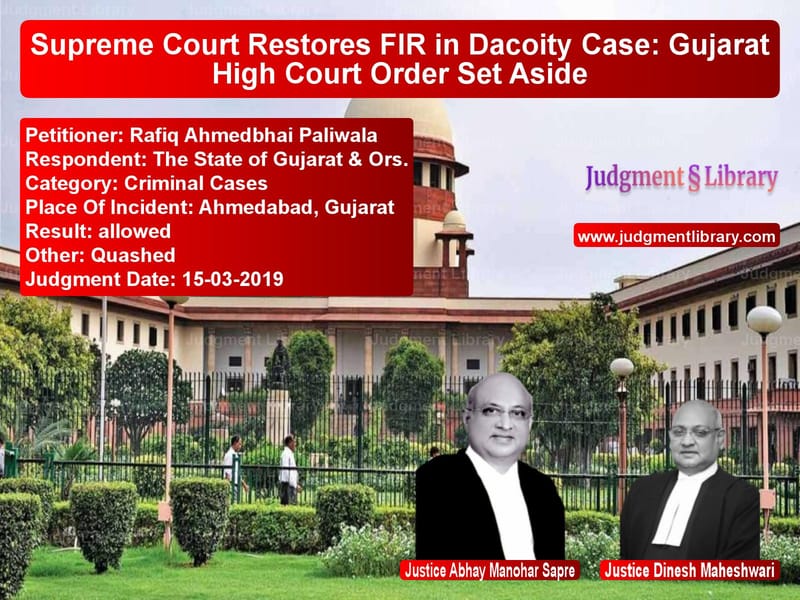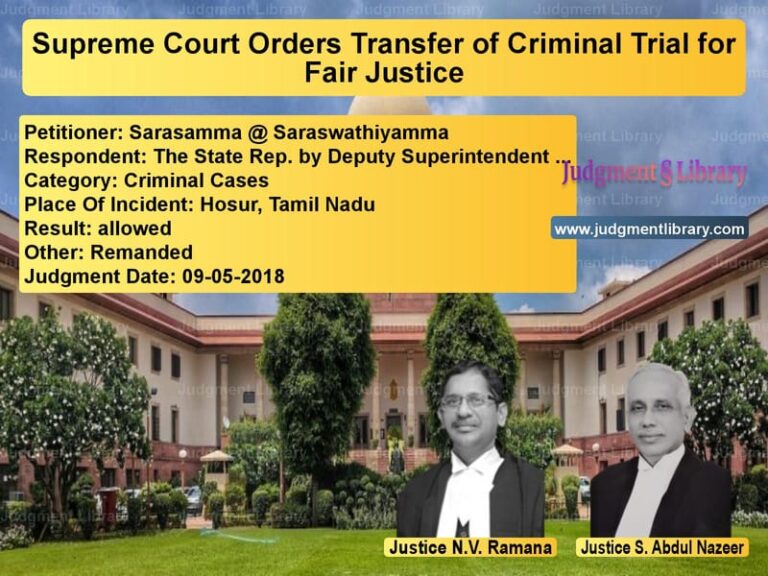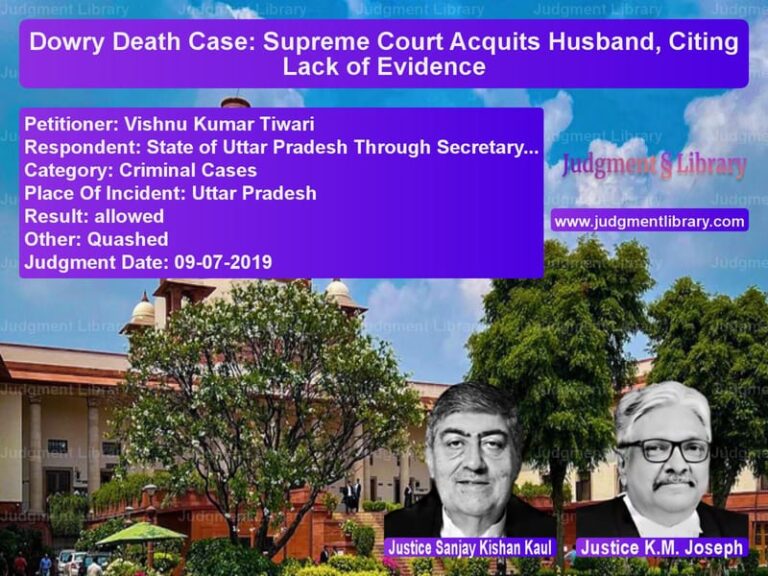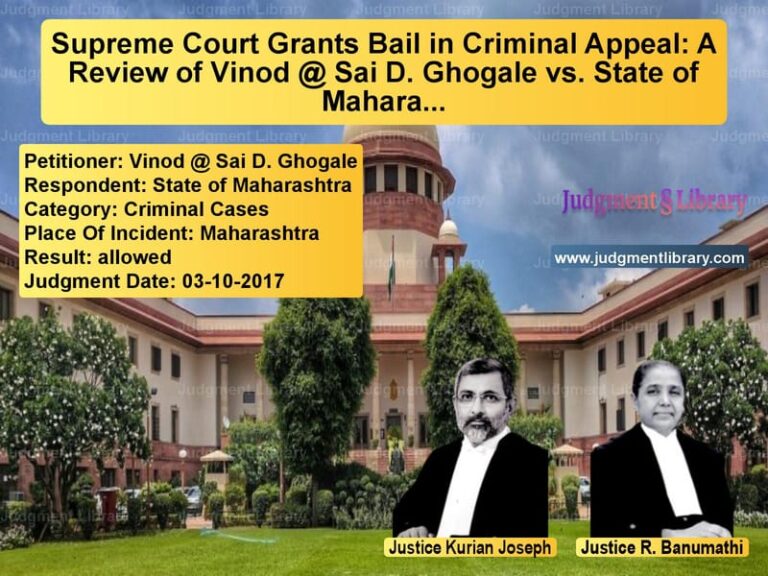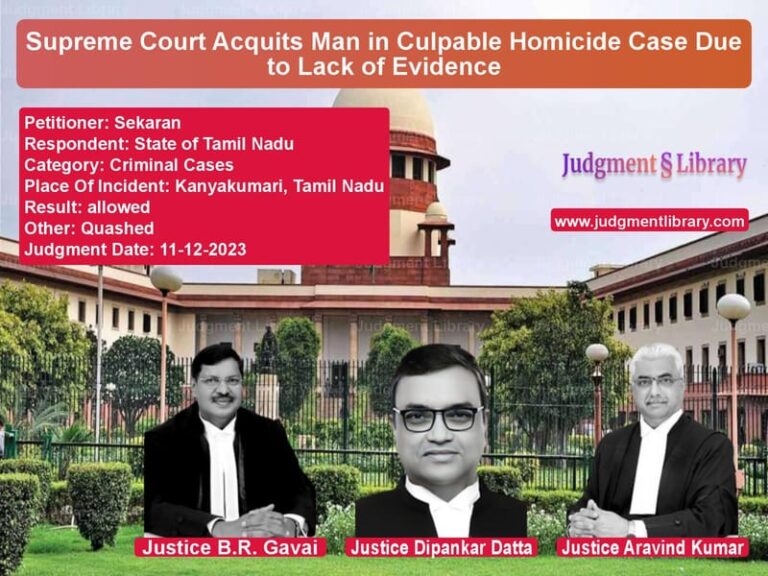Supreme Court Restores FIR in Dacoity Case: Gujarat High Court Order Set Aside
The case of Rafiq Ahmedbhai Paliwala vs. The State of Gujarat & Ors. involved a legal battle over the quashing of an FIR related to serious criminal offenses under Sections 392, 395, and 397 of the Indian Penal Code (IPC). The Supreme Court ruled against the Gujarat High Court’s decision to partially quash the FIR and reinstated the case for full investigation.
Background of the Case
The case originated from an FIR lodged at the Gaekwad Haveli Police Station, Ahmedabad. The complainant alleged that a group of accused committed offenses punishable under Sections 392 (robbery), 395 (dacoity), and 397 (robbery or dacoity with an attempt to cause death or grievous hurt), along with other minor offenses under Sections 143, 147, 148, and 323 of the IPC and Section 135(1) of the Gujarat Police Act.
The accused approached the Gujarat High Court under Section 482 of the Code of Criminal Procedure, 1973, seeking quashing of the FIR. The High Court accepted their plea in part, quashing the FIR in relation to Sections 392, 395, and 397 IPC while allowing the investigation to proceed for the remaining minor offenses.
Arguments by the Petitioner (Complainant – Rafiq Ahmedbhai Paliwala)
- The complainant challenged the Gujarat High Court’s decision, arguing that the High Court erred in quashing the FIR before a proper investigation was completed.
- There was prima facie evidence that the accused were involved in a serious crime, and the investigation should have been allowed to reach its logical conclusion before any interference.
- The High Court’s decision to quash only the major offenses while keeping the minor offenses intact was unjustified.
Arguments by the Respondents (Accused Persons)
- The accused contended that even if the allegations in the FIR were accepted as true, they did not amount to an offense under Sections 392, 395, or 397 IPC.
- They claimed that there was no common intention among the accused to commit dacoity, and the case did not meet the legal threshold required for the charges.
- They relied on the inherent powers of the High Court under Section 482 CrPC to quash an FIR that failed to establish a prima facie case for the more serious charges.
Supreme Court’s Analysis and Judgment
The Supreme Court reviewed the Gujarat High Court’s reasoning and found that the decision was premature and unwarranted. The Court emphasized the importance of allowing a proper investigation before quashing serious criminal charges.
- “The High Court, in our view, instead of quashing the FIR at such a preliminary stage should have directed the IO to make proper investigation on the basis of the FIR and then file proper charge sheet on the basis of the material collected in the investigation accordingly.”
- “It was more so because we find that FIR did disclose prima facie allegations of commission of concerned offenses.”
- “We cannot, therefore, countenance the approach of the High Court when it proceeded to quash the FIR partly in relation to more serious offenses (Sections 392, 395, and 397 IPC) without allowing the IO to make proper investigation into its allegations.”
Final Judgment
The Supreme Court set aside the Gujarat High Court’s order and restored the FIR in full, directing the Investigating Officer (IO) to:
- Conduct a thorough and impartial investigation into the allegations made in the FIR.
- Complete the investigation and submit a charge sheet within three months.
- Proceed strictly in accordance with law without being influenced by any prior observations.
Significance of the Judgment
This ruling reinforces that:
- Courts should exercise caution when quashing FIRs at an early stage, especially in cases involving serious offenses.
- Investigating agencies should be allowed to collect and present evidence before courts determine the merits of an FIR.
- Quashing FIRs before a proper investigation can lead to miscarriage of justice and hinder the rule of law.
Conclusion
The Supreme Court’s ruling in Rafiq Ahmedbhai Paliwala vs. The State of Gujarat underscores the importance of allowing full investigations in criminal cases before judicial intervention. By restoring the FIR, the Court upheld the principles of fair investigation and ensured that the accused could not escape prosecution for serious crimes due to premature quashing of charges.
Petitioner Name: Rafiq Ahmedbhai Paliwala.Respondent Name: The State of Gujarat & Ors..Judgment By: Justice Abhay Manohar Sapre, Justice Dinesh Maheshwari.Place Of Incident: Ahmedabad, Gujarat.Judgment Date: 15-03-2019.
Don’t miss out on the full details! Download the complete judgment in PDF format below and gain valuable insights instantly!
Download Judgment: Rafiq Ahmedbhai Pali vs The State of Gujarat Supreme Court of India Judgment Dated 15-03-2019.pdf
Direct Downlaod Judgment: Direct downlaod this Judgment
See all petitions in Attempt to Murder Cases
See all petitions in Custodial Deaths and Police Misconduct
See all petitions in Fraud and Forgery
See all petitions in Theft and Robbery Cases
See all petitions in Judgment by Abhay Manohar Sapre
See all petitions in Judgment by Dinesh Maheshwari
See all petitions in allowed
See all petitions in Quashed
See all petitions in supreme court of India judgments March 2019
See all petitions in 2019 judgments
See all posts in Criminal Cases Category
See all allowed petitions in Criminal Cases Category
See all Dismissed petitions in Criminal Cases Category
See all partially allowed petitions in Criminal Cases Category

